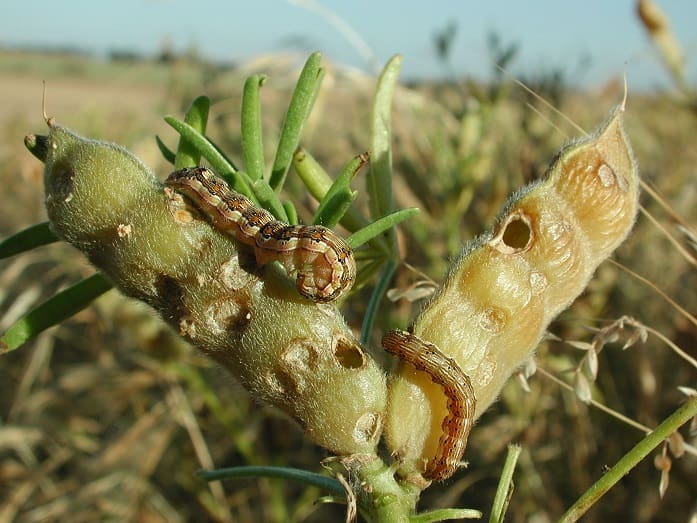
Native budworm, pictured on a lupin pod, is indigenous to Australia and can develop large populations over extensive areas on native plants. The moths often migrate into agricultural regions in late winter and spring. (Photo: DPIRD)
WESTERN Australian growers are advised to inspect canola and pulse crops for native budworm caterpillars (Helicoverpa punctigera), which have escalated in northern and central areas in recent weeks and could become an issue farther south.
Budworm is indigenous to Australia and can develop large populations over extensive areas on native plants, often migrating into agricultural regions in late winter and spring, where it can damage crops.
Department of Primary Industries and Regional Development (DPIRD) entomologist Dustin Severtson, who conducts department research with Grains Research and Development Corporation (GRDC) investment, has advised growers to be conscious of the potential for populations of the late-season pest to increase rapidly in crops.
“Many growers in WA’s northern agricultural areas will have sprayed for budworm caterpillars in past weeks given high numbers, and many growers in central areas are also now spraying as numbers have risen quickly recently in this region,” he said.
“Growers in southern and south-western grainbelt areas are urged to monitor crops in case there is a surge in caterpillar numbers here too, which is possible given the recent flights of the moths detected in these regions in DPIRD and the GRDC’s moth trapping program.
“DPIRD records numbers of budworm moth numbers on a weekly basis (http://bit.ly/2Pa5LJI), which provides an advanced warning to growers of the likely risk of budworm caterpillars being found in crops in subsequent weeks, and moth numbers have increased in many areas in recent weeks.
“If you haven’t already done so, I encourage you to inspect crops, and to sample crops using a sweep net before deciding whether to spray them – taking multiples of 10 sweeps in different parts of a crop.”

DPIRD entomologist Dustin Severtson encourages growers to check economic thresholds before deciding whether to spray crops. (Photo: GRDC)
Dr Severtson encouraged growers to check thresholds before deciding whether to spray crops, and to use a budworm economic threshold table, available on the DPIRD website at http://bit.ly/2O04l8a, in which growers can enter sample figures, along with grain prices and control costs.
He advised growers to be aware of insecticide withholding periods close to harvest and to be conscious that windrowing was classified as harvest.
“Budworm can damage crops in the withholding period, so it is advisable to aim to achieve one, well-timed spray prior to the withholding period, to help prevent secondary outbreaks,” Dr Severtson said.
“Budworm populations often crash due to predators, fungus and other reasons, so monitoring numbers in the field can save on unnecessary spraying in some cases.”
Dr Severtson advised growers to also look out for diamondback moth and aphids in lupin, and aphids in canola crops.
ConsultAg agronomist Brad Joyce said many growers in the central grainbelt where he worked were spraying for budworm, which were present in field pea, chickpea and serradella, as well as canola and lupin.
“Budworm are showing up right through my area, from York to Merredin and down to Narembeen, and, in many cases, they are above or well above minimum threshold levels,” he said.
“In a number of canola crops, cabbage and turnip aphids are also present at or near threshold levels and can be controlled at the same time crops are sprayed for budworm.”
Source: GRDC
More information about management of and economic thresholds for budworm can be found on the DPIRD website at http://bit.ly/2P8PaWZ and pesticide options for budworm control are at http://bit.ly/2NlvpcQ. A GRDC video about budworm is available at http://bit.ly/2zPlZTy.

HAVE YOUR SAY